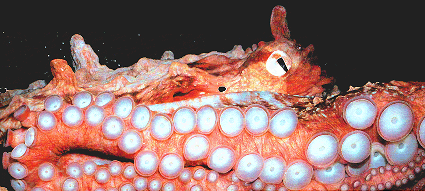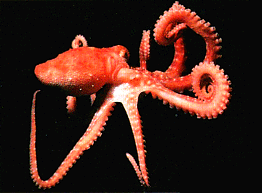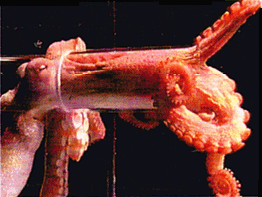Who are you calling a sucker?
 |
Giant of the deep: off the Pacific coast octopuses
such as this (below) can grow up to a span of 8m (26ft) |
Not many of us would credit an octopus or a squid with intelligence but,they
can "talk" have a sense of humour - and may even grow to become truly terrifying
monsters.
Gareth Huw Davies
Who are the Mensa members in the
oceans? Whales, of course. Dolphins, no argument.
Cephalopods? Surely some mistake.
A few nifty eight-armed party tricks from the octopus, some schoolboy japes
from the ink-throwing squid, and you have the full intellectual capacity
of this lowly mollusc. Or so we thought.
The makers of this week's Natural World,Incredible Suckers, cast their
net from laboratory tank to deep sea, braved sharp-shooting cuttlefish, survived
a shipwreck, and hauled in a complete reassessment of cephalopods.
Off the Cayman Islands they filmed Caribbean reef squid, which
scientists believe "talk" through intricate changes in posture,
skin pattern
and colour. "People view these creatures as lowly slugs," says underwater
cameraman Mike deGruy. "Yet, it is crystal clear that they are communicating
with each other and possibly even with us. In terms of their behaviour and
ability - and that includes even the ability to think - they are right at
the top of the intelligence scale for invertebrates [animals without backbones]
."
"We have a rapport with primates because
we can make eye contact. That normally isn't there with fish and invertebrates.
However,
cephalopods
will watch you when you walk into a room where they are in tanks. It's an
eerie feeling, and it separates them from other marine life."
DeGruy describes cuttlefish, in laboratory tanks, having fun. "At 2-3in in
size, they look right at us, then come and attack our fingers in an obvious
display of play. Sometimes two of them branch off, come to the surface and
with perfect accuracy deliberately spit a jet of water straight at us, and
drench our faces time and again. They seem to do it as pure entertainment,
like teenagers at play. It's a wonderful thing to see. Then, as they grow
into adults, this stops."
The filming of Incredible Suckers almost ended in disaster
off the Pacific island of Pelau, just as cameras on a remote control vehicle
(ROV) 800ft down began to transmit spectacular pictures of
nautilus. Without warning, the main boat, with
eight people aboard, began to sink. Frantically, they jettisoned the $250,000
ROV, but the boat sank before they could reach a nearby reef. "If a fishing
boat hadn't promptly answered our Mayday, we wouldn't have made it," says
deGruy. "I wonder if all that calamari late was coming back to haunt me.
I have never touched squid since."
Nature's Houdini |
|
 |
 |
| Octopuses are a mass of thinking,
sinuous muscle that flows like water. With one of the most ambidextrous body
designs on earth, octopuses can squeeze through spaces not even Houdini would
dare attempt. As can be seen in this week's Natural World, this octopus has compressed itself to one-tenth of its normal body size to squeeze through a glass tube. Such remarkable malleability in tight places has a practical purpose - this thinking, scheming predator can hunt in rock crevices into which competing creatures of its size couldn't hope to fit. |
|
But what of the fabled giant squid, terror of the black lagoon,
scourge of Captain Nemo in 20,000 Leagues Under the Sea and, so the old mariners
say, hauler-down of entire sailing ships?
They tried everything, and managed to get the first ever images of a half-monster
squid. But the true giant, never even seen underwater, eluded them. "Those
sailors didn't dream that stuff up," says deGruy. "It's down there somewhere.
I'm not finished with that guy."